- Home
- Alison Weir
Lancaster and York: The Wars of the Roses Page 8
Lancaster and York: The Wars of the Roses Read online
Page 8
All the Beauforts were competent, vigorous and ambitious people. Lacking an inheritance from Gaunt, whose lands and titles descended to Henry IV, they acquired land and wealth from the Lancastrian kings in return for faithful service and sheer hard work. Both John and Thomas Beaufort were good friends and advisers to Henry IV, serving him in the council chamber and in the field of battle. John’s estates were located mainly in the west of England, and his chief residences were at Corfe Castle in Dorset and Woking in Surrey. He became Great Chamberlain of England and Captain of Calais before dying in 1410 at the Hospital of St Katherine-by-the-Tower in London. He was buried in Canterbury Cathedral and succeeded as Earl of Somerset by his son, who died childless in 1418. He in turn was succeeded by his younger brother, another John Beaufort.
Henry Beaufort had turned out to be a clever and gifted lawyer, and had acquired a substantial number of church appointments. While still in his twenties he had become Chancellor of Oxford and Bishop of Lincoln, and in 1399 he had abandoned Richard II in Ireland and hastened to join Henry of Lancaster. Bishop Beaufort now enjoyed substantial wealth and a luxurious lifestyle. In every sense he was a prince of the Church, and his vow of celibacy did not preclude him from keeping a mistress.
In 1402, the Bishop was made a member of the King’s Council, and in 1404 he was translated to the influential and richest – at around £4000 per annum – of English bishoprics, that of Winchester, where he succeeded William of Wykeham. Despite his youth, he was now a central figure in English politics, entrusted with important matters of diplomacy. His fortune grew steadily from ecclesiastical revenues, the export of wool and manorial rents, and it was at this time that he began to operate as chief financier to the House of Lancaster, to whom he made a steady series of substantial loans and gifts.
Beaufort was proud, volatile and provocative, and had already incurred the enmity of Archbishop Arundel, who was instrumental in persuading Henry IV to exclude the Beauforts from the succession. This enmity may well have been the result of Beaufort making the Archbishop’s niece pregnant.
The youngest of the Beaufort brothers, Thomas, had matured into a man of integrity and wisdom. Less grasping than Henry, he carried out his duties with diligence. Henry IV entrusted him at various times with the offices of Admiral of the North West of Ireland, Aquitaine and Picardy, Commander of Calais, and Chancellor of England. He proved an able strategist and perceived the crucial importance of defending England’s possessions in France. Thomas married a kinswoman of his brother-in-law, the influential Ralph Neville, Earl of Westmorland, and thereby gained a firm friend in the Earl and the backing of the powerful Neville affinity.
Henry IV could count himself fortunate in having the support of his Beaufort half-brothers, whose descendants would remain loyal to the House of Lancaster for the next sixty years.
By 1409 the rebels who had dominated Henry’s first decade as king had been eliminated. He was now on better terms with the French and the Scots, and also with his own magnates, and therefore in a much stronger position. However, he was still short of money, and there had been a noticeable degeneration in law and order. But this was not all that the King had to contend with: from 1405 onwards he suffered extreme ill-health.
The Brut chronicle says that immediately after Archbishop Scrope’s execution Henry was smitten with leprosy, while Giles’s Chronicle claims that the leprosy broke out during the same hour as Scrope’s death. Most people, including the King himself, regarded this visitation as evidence of God’s wrath. The first attack of the disease was terrible indeed, and caused Henry to scream with pain and cry out that he was on fire. Worse still, with pain came disfigurement. John Capgrave says that from 1405 ‘the King lost the beauty of his face. He was a leper, and ever fouler and fouler.’ His face and hands were covered with large pustules ‘like teats’ and his nose became misshapen. The swellings and rashes on his skin grew so vile that few people could bring themselves to look at him. Later on, a tumour grew beneath his nose, and his flesh began to rot. The doctors could do nothing for him. Rumours about his condition were manifold: the French believed his toes and fingers had fallen off, the Scots that he had shrunk to the size of a child.
What was this terrible disease? It was certainly not leprosy. Modern medical opinion is that it could have been syphilis, or tubercular gangrene, combined with erysipelas, which produces a burning sensation. The condition of Henry’s well-preserved face, seen upon his exhumation in 1831, proved that contemporary descriptions of his skin disease were somewhat exaggerated. But in 1408 the King also suffered a mild stroke and thereafter his general health deteriorated. He suffered fainting fits and some form of heart complaint, and was essentially an invalid, unable even to walk on occasions.
As the King’s health declined, the Beauforts successfully increased their influence at court. The Prince of Wales, impatient to wear the crown, sought to gain control of the kingdom and allied himself with his Beaufort uncles in an attempt to seize power. This led to exceedingly strained relations, and eventually total estrangement, between father and son. Despite his illness, the King refused to abdicate. He was determined to govern England himself right to the end, even though he was becoming increasingly enfeebled. When, at times, the burden of sovereignty became too much he relied on Archbishop Arundel, his Chancellor, who tried unsuccessfully to ensure that the Prince of Wales and the Beauforts did not gain control of the government. In 1409 Arundel was forced through young Henry’s machinations to resign as Chancellor, and the Prince and his faction became the dominant power on the Council.
In 1412, Henry IV declared war on France, a war he could not hope to prosecute, although he was planning to lead an army into Aquitaine. Walsingham wrote: ‘I believe that he could have taken France if the strength of his body had equalled the strength of his spirit.’
On 20 March 1413, the King walked painfully to the shrine of St Edward the Confessor in Westminster Abbey, where he knelt to pray. Suddenly, he collapsed in agony with a seizure. His attendants carried him into the nearby Jerusalem Chamber, so called because of the tapestries depicting the history of Jerusalem which hung there. When he could speak, Henry recalled that he had once expressed a desire to go on a final crusade and die in Jerusalem.
They laid him on a pallet by the fire, but in spite of the warmth he complained that his arms and legs felt cold. Guilt seems to have weighed heavily on him, for he was heard to whisper, ‘Only God knows by what right I took the crown.’ The King’s confessor arrived and begged Henry to repent of the murder of Archbishop Scrope and his usurpation of the throne. Henry replied that he had already received absolution for the killing of Scrope: as for usurping the crown, his son would never let him abjure it.
He was obviously dying. Custom decreed that the crown be placed by his side on a cushion of cloth of gold, and it was brought at once. By then the King appeared to be dead and a napkin was laid over his face. The Prince of Wales had been summoned; he entered the chamber and picked up the crown, about to place it on his head. At that moment the King stirred. He talked for a while with the Prince and was heard to say that he repented of ever having charged himself with the crown of England, for it had proved too heavy a burden for him. At the last he made his peace with his son, and died blessing him.
Henry IV was buried behind the high altar of Canterbury Cathedral, near to the tomb of the Black Prince and the shrine of St Thomas à Becket. Later a fine tomb was erected to his memory, on which were placed marble effigies of Henry and his second wife, Joanna of Navarre, who outlived him by twenty-four years.
Henry left England more prosperous and in a more settled state than he had found it: while he had achieved nothing that brought glory upon himself, he had successfully vanquished his enemies and driven baronial opposition underground, and, although there were still those who regarded him as an upstart whose right to the crown was dubious, his son succeeded unchallenged to the throne.
4
The Flower of
Chris
tian Chivalry
On Passion Sunday, 9 April 1413, Henry of Monmouth was crowned as King Henry V at Westminster Abbey. Becoming king had a profound effect on him: Walsingham states that ‘as soon as he was made king he changed suddenly into another man, zealous for honesty, modesty and gravity, there being no sort of virtue that he was not anxious to display’. His biographer, Titus Livius, says that he reformed and amended his life. Elevated to kingship, he abandoned his dissolute young friends and paid heed to the experienced men of affairs on his Council. His main objective at the beginning of his reign was to distance himself from his father’s style of government and thereby earn fresh popularity and support for Lancaster.
In youth Henry had led a debauched life. The evidence for this cannot be discounted, although it may have been exaggerated in later years. Thomas Elmham, the chronicler, wrote that ‘passing the bounds of modesty, he was the servant of Venus’ and ‘found leisure for the excesses common to ungoverned age’. Having fought his first battle at fifteen, he had gained an early and wholly justified reputation as a brilliant soldier and military strategist. He also had a passion for singing, and was an accomplished musician.
According to Thomas Elmham, Henry V had ‘an oval, handsome face with a broad, open forehead, a straight nose, ruddy cheeks and lips, a deeply indented chin, small, well-formed ears, hair brown and thick, bright hazel eyes, and stature above the average’. In youth he was clean-shaven and wore his hair cut short and straight in the Norman military fashion. He was of lean and muscular build, agile and very strong. French envoys once described him as ‘a prince of distinguished appearance and commanding stature. His expression seemed to hint at pride.’ However, a French priest, Jean Fusoris, thought he looked more like a priest than a soldier.
Besides having a love of music, Henry V was an enthusiastic sportsman who enjoyed hawking, fishing, wrestling, leaping and running, in which ‘he excelled commonly all men’, being faster, it was said, than a dog or even an arrow. Surprisingly, he had little interest in jousting.
Books were his greatest treasure. He had an extensive library and was literate in English, French, Latin and Welsh. He enjoyed books on history, theology and hunting, as well as the works of Chaucer, Hoccleve and Lydgate. He was also a connoisseur of the arts and architecture, although not on the same scale as Richard II.
English chroniclers are unanimous in their praise of Henry V, excelling themselves in superlatives. Walsingham describes him as ‘prudent, far-seeing, magnanimous, firm, persistent, war-like and distinguished’. However, those who knew him found him a cold man who inspired respect rather than love. Taciturn in speech, a man of few words who could be a good listener and was gifted with a rather dry wit, he was highly self-disciplined and expected others to be too. He had a formidable presence, a lordly and severe manner, and was somewhat melancholy in temperament, tending to look serious at moments of triumph. However, he usually reacted positively to setbacks.
Henry had a good deal of common sense, being a perceptive man who was a wise judge of character, and he could also be persuasive and often aggressive when it came to asserting his rights. He was discreet, even secretive, but made it a point of honour to treat everyone with the utmost affability. ‘He went straight to the point,’ wrote a French envoy. On occasion he could appear sanctimonious and pedantic, parading his virtues, and making no secret of the fact that for seven years after his accession he remained chaste. His worst fault would prove to be a ruthless brutality that was only unleashed when his authority was challenged. Once, during a siege, a man danced on the wall of the fortress, mocking the King and blowing a trumpet so as to imitate a fart; when the town was captured Henry made a point of having him executed.
Henry V inherited the same insecurities his father had faced. Many regarded the House of Lancaster as a usurping dynasty and looked upon March as the rightful king; some even believed Richard II was still alive. However, in fourteen years of Lancastrian rule, people had generally grown used to the new dynasty and it had gained a considerable degree of acceptance, something that the new King was able to reinforce.
Henry V was fortunate in that he possessed all the attributes required of a successful mediaeval ruler. He was deeply pious in an unquestionably orthodox way, spending hours at prayer each day and making many pilgrimages to the shrines of saints. One of his ambitions was to wrest Jerusalem back from the Turks. He was severe with heretics and virtually stamped out Lollardy.
He was also a brilliant general, a courageous leader who took a personal interest in his men and in the routine practicalities of warfare, but who was also a stern disciplinarian prepared summarily to execute anyone who disobeyed him. His contemporaries saw him as the embodiment of the ‘parfait, gentil knight’ described by Chaucer, a Christian hero-king to whose name legends swiftly attached themselves. He embodied as such all the ideals of chivalry, and his magnificent reputation made a powerful impression on his contemporaries, and indeed on English history. Not for nothing was he called the flower of Christian chivalry.
He had ‘a great will to keep justice, wherefore the poor folk loved him above all others, for he was careful to protect them from the violence and wrong that most of the nobles had done them’. To the poor, he was approachable and generous: his justice was strictly impartial, meted out to friend and foe, high and low alike. He was not a merciful king and his enemies feared his vengeance, which made his conquests easier since his reputation rode before him.
Henry V was a born leader who ascended the throne with astonishing confidence, determined to provide England with ‘good governance’. Dedicated to his task, he proved an adept administrator and a superb politician, believing that the prosperity of the realm depended on the integrity and orthodoxy of its ruler and that any threat to the monarchy was a threat to a divinely ordered society. Even his enemies praised him as a wise ruler. He was careful in his spending, avoided borrowing money, and planned well ahead, all of which resulted in a significant recovery of the royal finances. Henry closely supervised the royal administrators who worked under him, and sacked any corrupt officials.
He made consistent efforts to win the support and co-operation of his magnates. His aggressive war policy united them behind him and also brought England to the forefront of European politics. The resultant concord between the King and his nobility made for a greater degree of success in his enterprises. He replaced Arundel as chancellor with Henry Beaufort, Bishop of Winchester, his ‘oldest uncle and closest councillor’, but relations between them were not always smooth. In 1417 the ambitious Beaufort accepted a cardinal’s hat and the office of papal legate from the Pope without first bothering to obtain Henry’s permission, as law and custom demanded. The King was furious and made him surrender both hat and appointment, which put paid to Beaufort’s ambition to occupy a position centre-stage in the European Church.
Shakespeare would later portray Henry V as the vindicator of the House of Lancaster, whose deeds and reputation removed the taint of usurpation that adhered to his dynasty. Certainly, England had not been so well governed since the time of Edward III.
Henry embarked upon a general policy of conciliation. As soon as he became king he demonstrated his confidence as a ruler by releasing the Earl of March, now twenty-one, from house arrest, and he also restored Hotspur’s son to the earldom of Northumberland. On the day before his coronation, Henry made March and his brother Roger Mortimer Knights of the Bath in a ceremony at the Tower of London. Clearly he did not regard March as a rival; nor did he acknowledge his superior claim to the throne, for he named his own brother Thomas, Duke of Clarence, as heir presumptive to the crown. March was a political unknown, unlikely to command significant support from the magnates, and a stranger to the populace at large, even if there were still those in high places who felt that he was rightful King of England and had been shabbily treated. Henry V took steps to rectify this: he made the Earl a member of his household and admitted him to his inner circle of advisers.
Fortun
ately for Henry, March was not particularly ambitious. His early experiences had perhaps crushed his self-confidence, and he lacked the qualities required of a king. He was a pleasant man, friendly and kind, entirely lacking the dynamism that drove Henry V. He found it hard to trust anyone, and went in fear of his awesome sovereign.
March was also, however, an impulsive and headstrong young man. Shortly after his release he secretly married his cousin, Anne Stafford, a great-granddaughter of Edward III, without first obtaining the requisite permission from the King. Henry was extremely displeased and fined the Earl £6666.13s.4d. (£6666.67). It has been conjectured that the forfeiture of such a vast sum made March resentful towards his sovereign, but since there is no record of his ever having paid the fine, it may well be that the King, knowing March’s loyalty was crucial, exercised his prerogative of mercy, having shown his cousin how easily he could ruin him.
March lived in great splendour in his London residence, Baynard’s Castle, on the banks of the Thames. His personal accounts survive and show him to have been an inveterate gambler. In the winter of 1413-14 he lost £157 at cards, backgammon, dice and cock-fighting. He kept a mistress called Alice at a house in Poplar, east of London, and spent large sums on her. He also frequented taverns and was not averse to the company of low-born folk.
By 1415, March had gained a degree of fame, and Jean Fusoris, who visited the English court from France that year, reported that many people would have preferred him to Henry for their king. However, their opinions were shortly to undergo a rapid change.
Not two months after Henry’s accession a poster had been nailed to the door of Westminster Abbey proclaiming that Richard II was still alive in Scotland. The monks of Westminster Abbey had continued to support those who wished to restore Richard, even to the extent of backing an earlier Lollard conspiracy against Henry IV, which was suppressed with shocking brutality: seven proven culprits were roasted in chains over a slow-burning fire and another twenty-four were hanged.

 Richard III and the Princes in the Tower
Richard III and the Princes in the Tower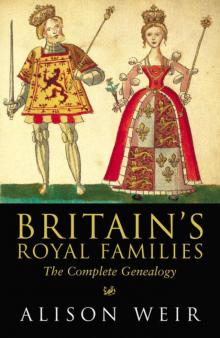 Britain's Royal Families: The Complete Genealogy
Britain's Royal Families: The Complete Genealogy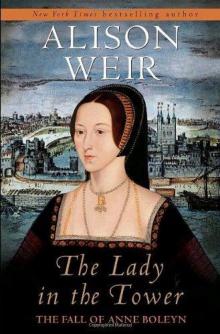 The Lady in the Tower: The Fall of Anne Boleyn
The Lady in the Tower: The Fall of Anne Boleyn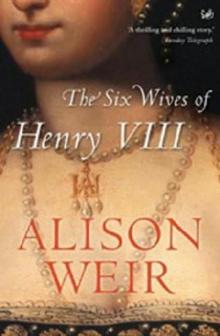 Six Wives of Henry VIII
Six Wives of Henry VIII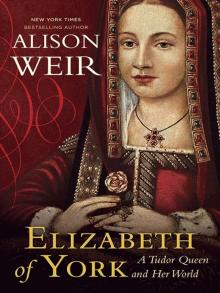 Elizabeth of York: A Tudor Queen and Her World
Elizabeth of York: A Tudor Queen and Her World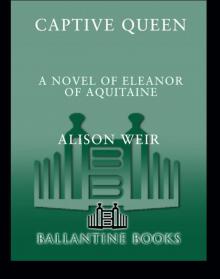 Captive Queen
Captive Queen Innocent Traitor
Innocent Traitor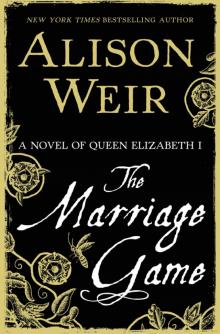 The Marriage Game
The Marriage Game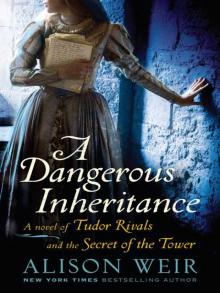 A Dangerous Inheritance
A Dangerous Inheritance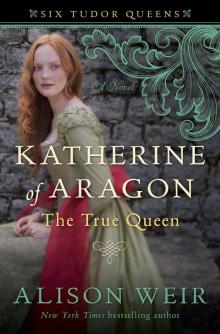 Katherine of Aragón: The True Queen
Katherine of Aragón: The True Queen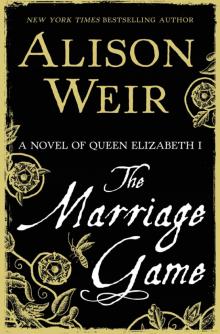 The Marriage Game: A Novel of Queen Elizabeth I
The Marriage Game: A Novel of Queen Elizabeth I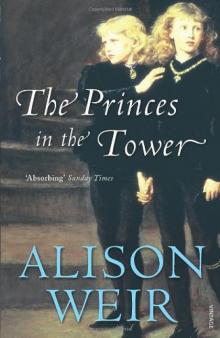 Princes in the Tower
Princes in the Tower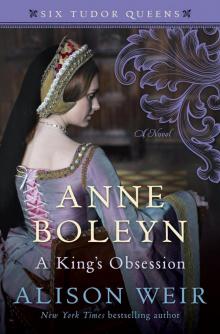 Anne Boleyn: A King's Obsession
Anne Boleyn: A King's Obsession Traitors of the Tower
Traitors of the Tower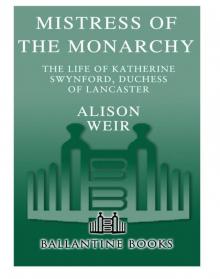 Mistress of the Monarchy: The Life of Katherine Swynford, Duchess of Lancaster
Mistress of the Monarchy: The Life of Katherine Swynford, Duchess of Lancaster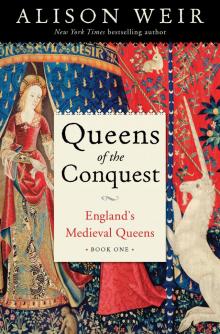 Queens of the Conquest: England’s Medieval Queens
Queens of the Conquest: England’s Medieval Queens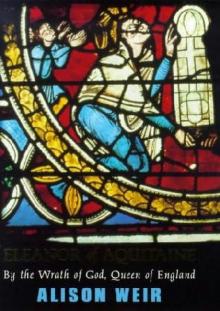 Eleanor of Aquitaine: A Life
Eleanor of Aquitaine: A Life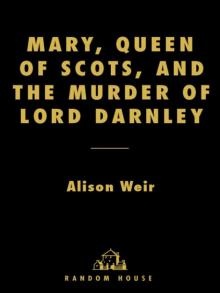 Mary, Queen of Scots, and the Murder of Lord Darnley
Mary, Queen of Scots, and the Murder of Lord Darnley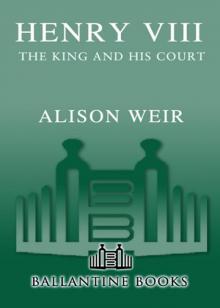 Henry VIII: The King and His Court
Henry VIII: The King and His Court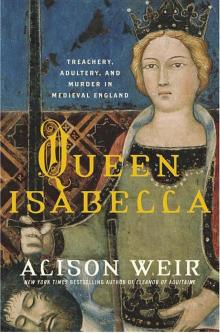 Queen Isabella: Treachery, Adultery, and Murder in Medieval England
Queen Isabella: Treachery, Adultery, and Murder in Medieval England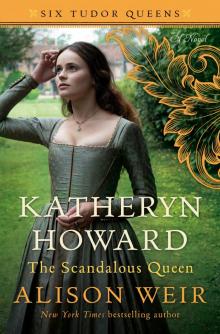 Katheryn Howard, the Scandalous Queen
Katheryn Howard, the Scandalous Queen Arthur- Prince of the Roses
Arthur- Prince of the Roses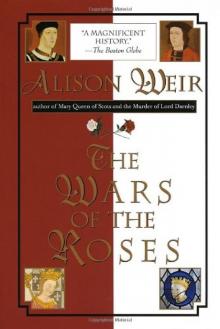 The Wars of the Roses
The Wars of the Roses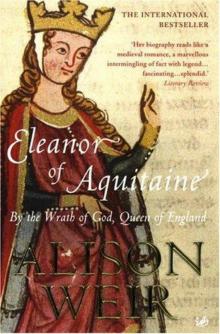 Eleanor of Aquitaine: By the Wrath of God, Queen of England
Eleanor of Aquitaine: By the Wrath of God, Queen of England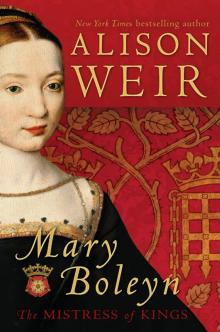 Mary Boleyn: The Great and Infamous Whore
Mary Boleyn: The Great and Infamous Whore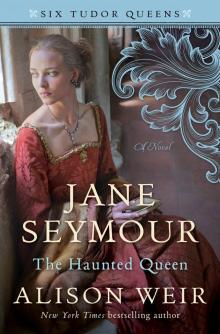 Jane Seymour: The Haunted Queen
Jane Seymour: The Haunted Queen Anna of Kleve, the Princess in the Portrait
Anna of Kleve, the Princess in the Portrait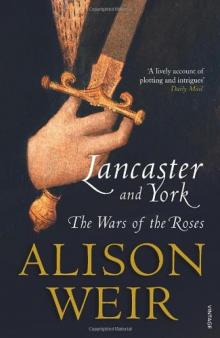 Lancaster and York: The Wars of the Roses
Lancaster and York: The Wars of the Roses The Grandmother's Tale
The Grandmother's Tale The Princess of Scotland (Six Tudor Queens #5.5)
The Princess of Scotland (Six Tudor Queens #5.5)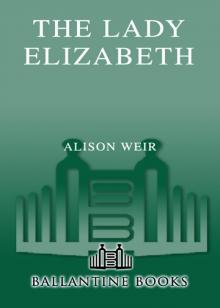 The Lady Elizabeth
The Lady Elizabeth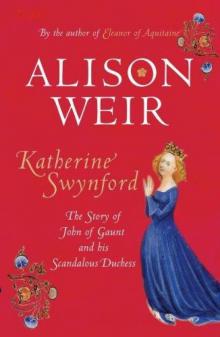 Katherine Swynford: The Story of John of Gaunt and His Scandalous Duchess
Katherine Swynford: The Story of John of Gaunt and His Scandalous Duchess The Curse of the Hungerfords
The Curse of the Hungerfords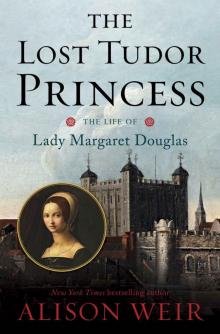 The Lost Tudor Princess: The Life of Lady Margaret Douglas
The Lost Tudor Princess: The Life of Lady Margaret Douglas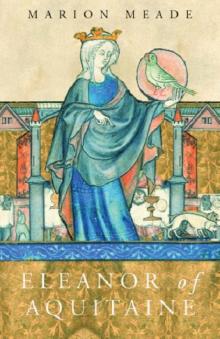 Eleanor of Aquitaine
Eleanor of Aquitaine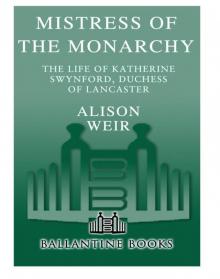 Mistress of the Monarchy
Mistress of the Monarchy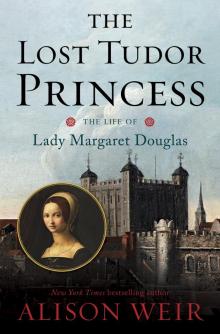 The Lost Tudor Princess
The Lost Tudor Princess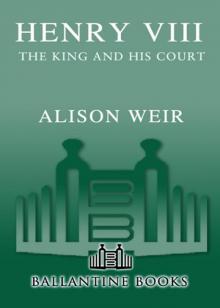 Henry VIII
Henry VIII Anne Boleyn, a King's Obsession
Anne Boleyn, a King's Obsession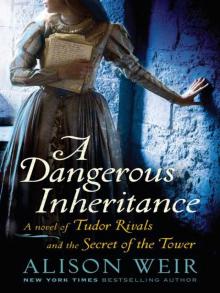 A Dangerous Inheritance: A Novel of Tudor Rivals and the Secret of the Tower
A Dangerous Inheritance: A Novel of Tudor Rivals and the Secret of the Tower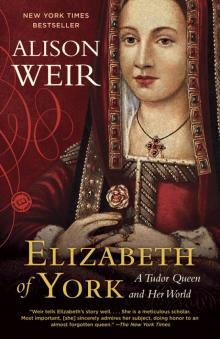 Elizabeth of York
Elizabeth of York Katherine of Aragon, the True Queen
Katherine of Aragon, the True Queen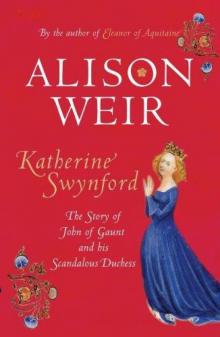 Katherine Swynford
Katherine Swynford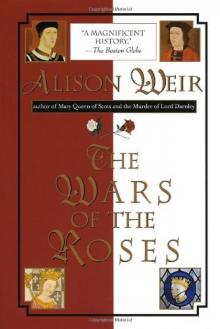 Wars of the Roses
Wars of the Roses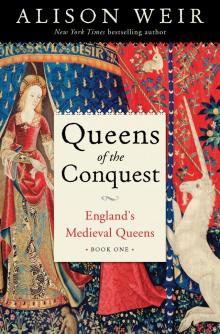 Queens of the Conquest
Queens of the Conquest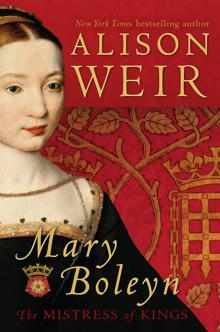 Mary Boleyn
Mary Boleyn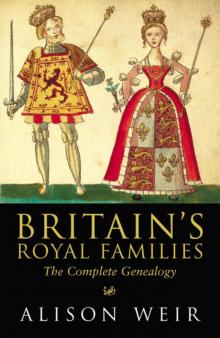 Britain's Royal Families
Britain's Royal Families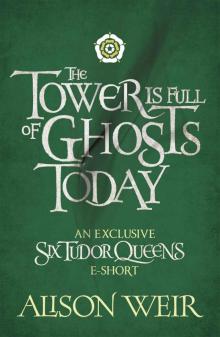 The Tower Is Full of Ghosts Today
The Tower Is Full of Ghosts Today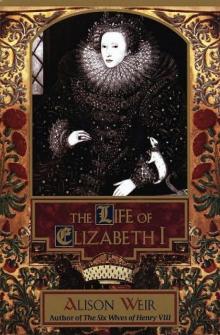 Life of Elizabeth I
Life of Elizabeth I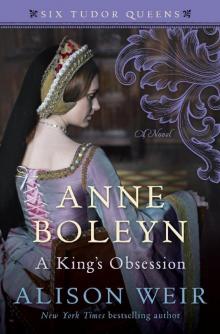 Anne Boleyn A King's Obssession
Anne Boleyn A King's Obssession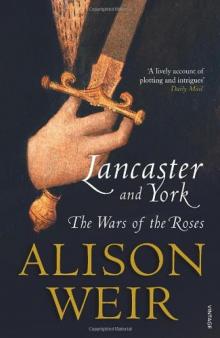 Lancaster and York
Lancaster and York Jane Seymour, the Haunted Queen
Jane Seymour, the Haunted Queen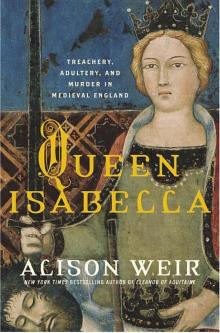 Queen Isabella
Queen Isabella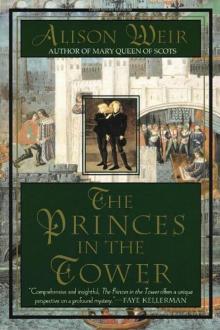 The princes in the tower
The princes in the tower